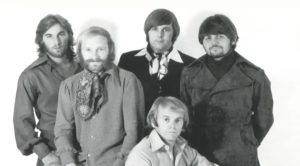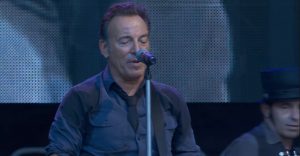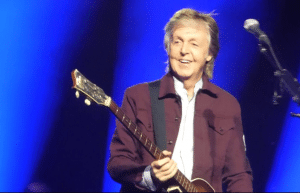The 5 Biggest Controversies That Damaged Bruce Springsteen’s Career

via Bruce Springsteen / YouTube
Bruce Springsteen has long stood as a symbol of American grit, blue-collar pride, and anthemic rock storytelling. With a career stretching across decades, his influence runs deep—woven into protest songs, working-class ballads, and unforgettable live performances. But even legends aren’t immune to public backlash.
For every chorus of applause, there’s been a moment of controversy that’s challenged Springsteen’s standing with fans and critics alike. While his artistry remains respected, certain decisions and outspoken stances have sparked debate and, at times, disappointment. Whether it was pricing missteps, legal entanglements, or political firestorms, Springsteen hasn’t always struck the right chord with the public.
This article isn’t about tearing down a music icon—it’s about examining the five major moments that stirred headlines and threatened to overshadow the music. These controversies didn’t just test Springsteen’s career; they tested his relationship with a fiercely loyal fanbase.
1. A Sudden Shift in Message
Bruce Springsteen first won over audiences with songs rooted in personal struggles, youthful romance, and emotional yearning. Albums like Greetings from Asbury Park, N.J. and Born to Run focused on escape, love, and ambition, painting vivid portraits of individual journeys. Fans connected with the raw, relatable emotions he poured into every lyric.
But as the 1970s ended, a shift began to emerge. With Darkness on the Edge of Town, Springsteen began steering his music toward heavier themes—grappling with societal decay, economic hardship, and the complexities of working-class life. This evolution deepened with later albums like The River and Nebraska, and ultimately culminated in Born in the U.S.A., a record often misread as patriotic but laden with criticism of America’s treatment of its veterans.
While critics praised the new depth in his songwriting, not all fans appreciated the change. Some missed the more personal storytelling of his earlier days and found the political direction to be heavy-handed. The transition divided his base, with longtime listeners unsure whether the new Springsteen still spoke for them.
View this post on Instagram
2. Political Stances That Alienated Fans
Springsteen has never shied away from expressing his beliefs, but his active involvement in the 2004 U.S. presidential election marked a major turning point. By campaigning for Democrat John Kerry and criticizing President George W. Bush, he inserted himself directly into the country’s political spotlight. What followed was an immediate backlash from a segment of his audience.
Republican fans, in particular, were vocal in their disappointment. Many felt betrayed, insisting that music and politics should remain separate. To them, The Boss had crossed a line, using his platform to push a political agenda rather than uniting people through music. This divide only deepened when Springsteen later voiced his support for Kamala Harris, again stirring frustration among conservative fans who had hoped he’d leave politics behind.
Over time, Springsteen’s activism became more frequent—speaking out on issues like war, economic disparity, and civil rights. While these moves earned him admiration from some circles, they also alienated fans who saw his performances as escapism, not political rallies. The polarization began to affect how certain audiences perceived both the artist and his work.
View this post on Instagram
3. Accusations of Nepotism
Following the tragic passing of Clarence Clemons, the beloved saxophonist of the E Street Band, Bruce made a heartfelt yet controversial decision. He appointed Jake Clemons—Clarence’s nephew—as his replacement. While many fans welcomed the move as a tribute, others were quick to raise the specter of nepotism.
Critics questioned whether Jake had earned the role or simply inherited it due to his last name. The fact that Patti Scialfa, Springsteen’s wife, was also a permanent member of the band didn’t help matters, as detractors accused Bruce of surrounding himself with family rather than the best talent available.
Despite the early criticism, Jake Clemons proved his musical chops and quickly won over most skeptics with energetic performances and genuine passion. Still, for some, the perception of favoritism lingers, casting a shadow over what was meant to be a heartfelt continuation of a musical legacy.
View this post on Instagram
4. The Ticketmaster Pricing Scandal
Springsteen built much of his reputation on being a man of the people, offering affordable shows that were accessible to everyday fans. But in 2022, that image took a hit when fans were stunned by concert ticket prices soaring to thousands of dollars, with some as high as $5,000 due to Ticketmaster’s “dynamic pricing” model.
While Bruce and his team defended the pricing by stating they were merely aligning with current industry standards, many loyal fans felt betrayed. The outrage spread across social media, with longtime supporters lamenting that their working-class hero had embraced a system that exploited them financially.
The controversy reignited debates over corporate ticketing practices and whether artists have a responsibility to intervene. For an artist whose brand is built on empathy and solidarity, the fallout was especially damaging—and for many, it marked a turning point in their relationship with Springsteen.
View this post on Instagram
5. The Unsettling Nature of “I’m on Fire”
One of Springsteen’s most well-known songs, “I’m on Fire”, has long been a fan favorite—but in recent years, it’s drawn renewed scrutiny. The lyrics, delivered in a slow, brooding tone, include lines that some listeners have found troubling. Phrases like “Hey little girl, is your daddy home?” have sparked interpretations that the song may be referencing inappropriate or even disturbing themes.
While many defenders argue that the song is simply a metaphor for yearning and desire, others contend that the language used evokes unsettling imagery. In a modern context, these lyrics have been reevaluated through a more critical lens, resulting in backlash from younger generations of fans.
Springsteen himself has never offered a detailed explanation of the lyrics, which has allowed speculation to persist. As a result, what was once a sultry classic has become a subject of debate, showing how even the most iconic tracks can be reshaped by changing social perspectives.












